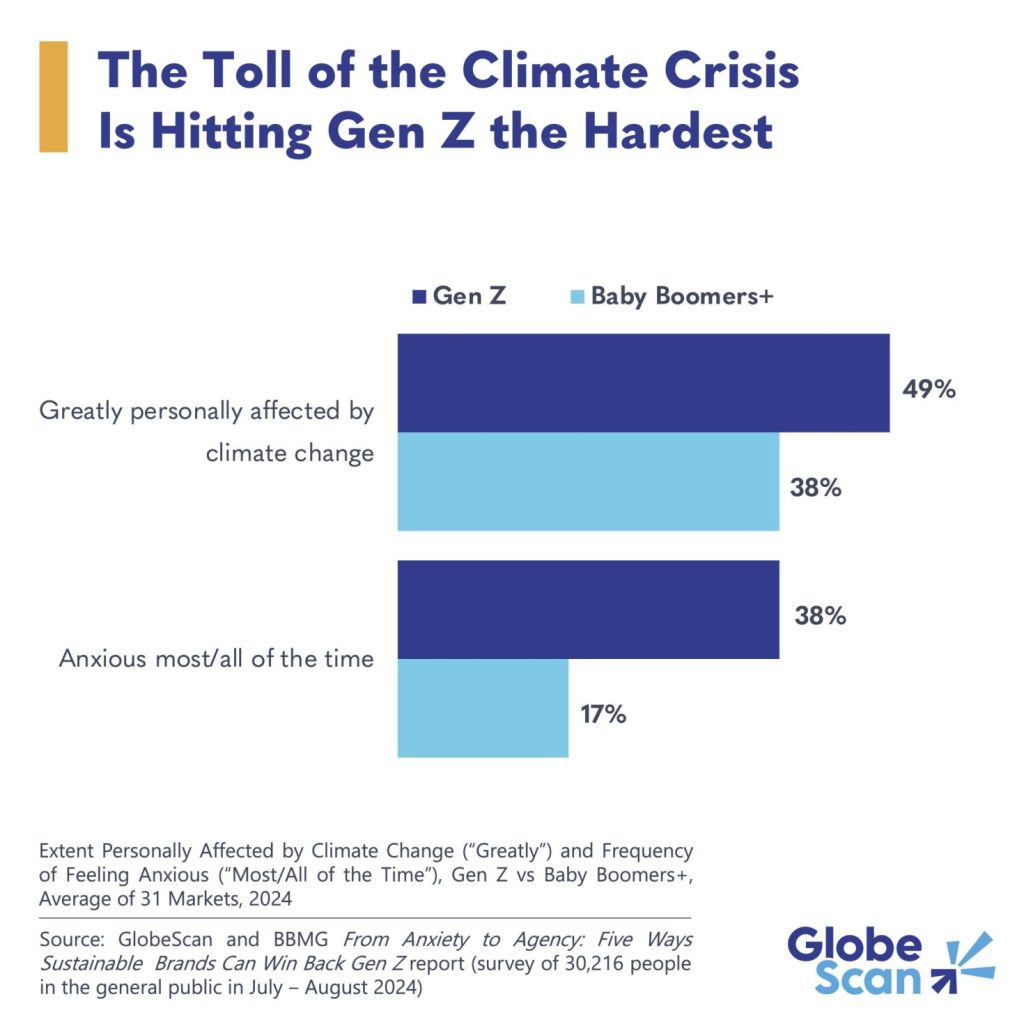Why climate anxiety is hitting Gen Z the most and how brands can respond
More than 30% of Gen Z respondents feel stressed or anxious about global warming all the time. Read More

- Gen Z feels the climate crisis in a deeply personal way: Nearly half of respondents in that age group say they’re “greatly personally affected” by climate change.
- As a result, Gen Z is increasingly overwhelmed and emotionally exhausted. Nearly four in ten report feeling anxious most or all of the time—double the rate of older generations.
- This is not a temporary dip, but a wake-up call for brands to deliver real, meaningful action that re-engages young people.
When it comes to climate change, the notion that younger generations are more hopeful than older cohorts may not be true.
Recent research from Trellis data partner GlobeScan and brand consultancy BBMG shows there’s a large contrast between younger and older generations when it comes to feeling concerned about climate change. Gen Z is disproportionately carrying the personal and emotional burden of the climate crisis, with more than seven in 10 Gen Z survey respondents saying they’re extremely worried about current and future harm to the environment caused by human activity and climate change.
Along with Millennials, Gen Z is the most likely to say they’re “greatly affected” by climate change, with 49 percent feeling the effects personally compared to just 38 percent of respondents who are Baby Boomers and older. Nearly four in ten (38 percent) Gen Z respondents also reported feeling stressed or anxious most or all of the time — more than double the rate among the oldest generations (17 percent). In short, Gen Z is carrying the emotional weight of the climate crisis more heavily than any other age group.
What this means
The research shows growing disengagement among Gen Z and sustainability professionals can’t afford to leave them feeling hopeless. In addition to feeling more personally affected by climate change than older generations, many are pulling back from sustainable behaviors, asking not how to help, but why they should bother. This isn’t just a moment of doubt — it’s a generational crisis of confidence. The emotional toll is high, the complexity feels overwhelming and the perceived lack of progress is fueling apathy and withdrawal.
This is a call to action for brands, governments and institutions: Gen Z doesn’t need empty promises — they want to see real progress. If sustainability leaders want to re-energize the most climate-conscious generation, they must create meaningful pathways for agency, hope and impact before the disengagement becomes permanent. Several ways to do this include:
- Lead with truth: Face challenges with radical honesty and bold imagination.
- Make power personal: Focus on small actions, immediate feedback and clear impact that boosts self-efficacy and unlocks momentum.
- Create connection loops: Build new relationships between people, products and planet to transform sustainable living into meaningful community.
- Invite joy: Enhance positive emotions to make sustainability a source of wellbeing and joy.
- Weave new stories: Honor reality and aspirations into new narratives to make sense of today and show what’s possible tomorrow.
Based on a survey of more than 30,000 people in 31 markets July-August 2024.
[Join more than 5,000 professionals at Trellis Impact 25 — the center of gravity for doers and leaders focused on action and results, Oct. 28-30, San Jose.]

Subscribe to Trellis Briefing
Featured Reports

The Premier Event for Sustainable Business Leaders
















